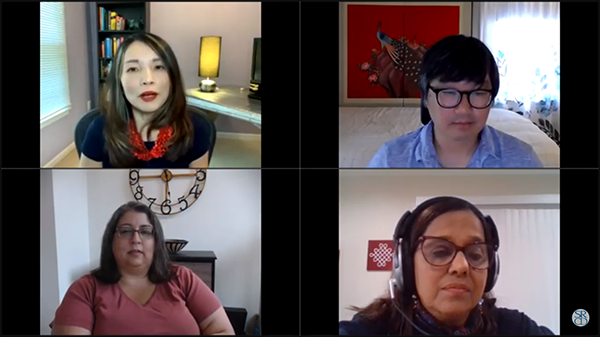|
May is both Asian Pacific American Heritage Month and Mental Health Awareness Month, and while these important occasions have come to an end, it is important to recognize that there are available resources, especially on how to support Asian and Asian Pacific Islander (AAPI) children and youth during the COVID-19 pandemic. In the 60-minute webinar, co-sponsored by the Asian Caucus of the Society for Research in Child Development (SRCD), pressing questions from parents, caregivers, and educators on how to support AAPI children during this pandemic were addressed by child development experts, touching on not only how it fits in a broader and historical context of racism, but also the different ways parents could protect their children. Following the death of George Floyd, as well as the rise of xenophobia and anti-Asian sentiments recently, it is important to acknowledge that racism has a long history in America that carries forward today for racially minoritized groups. To understand the backlash against Asian Americans, we have to observe the long, racialized history of xenophobia which dates back to the exclusion of Chinese immigrants in the 1880s, the internment of Japanese Americans in WW2, Koreans in Vietnam and Korean War, and South Asians during 9/11 and forward; now, Asian Americans, on good days, are portrayed as model minorities which, unfortunately, are used as a racial wedge that discounts the experiences of other racial minority groups. With the emergence of COVID-19, the use of ethnic slurs that inflames fear and hatred against Asians by politicians legitimizes racial attacks on Asians. Because of that, there has been a reported increase in direct and indirect racial discrimination as well as xenophobia which affects identity development and the mental health of Chinese parents and children living in the US. As parents, it is natural to want to protect children at all costs, making it difficult to raise these racial issues to them. While reluctance is normal, parents need to be proactive about these issues by instilling ethnic pride and racial socialization. Research suggests that parents need to make sure children feel safe and cared for, reassuring them that things will be okay. With this security, it is then appropriate to discuss what is happening using languages they understand while also introducing new terms (i.e. prejudice, stereotype, etc.) to help consolidate these experiences. Parents should also understand how to foster healthy and prideful identity in children with age-appropriate ways. As early as infancy, children start noticing differences based on perceptual characteristics which then develops to intuitive sorting and classifying at ages 3-4. Applying cultural and ethnic socialization strategies become important from ages 4-7 to support a healthy sense of development at a time when children start developing their own identity. After building a foundation of strong ethnic pride, racial socialization is essential as it teaches children what it means to grow up in this society as racialized minorities and, especially during this pandemic, how prejudice and stereotypes are amplified due to politicians creating a hostile climate for the Asian American community. Another important aspect of today's society that influences the way anti-Asian sentiments are being expressed right now is through media and technology. Of course, it comes as no surprise that media representation matters, media content matters, and immediate consumption matters. Unfortunately, the representation of Asian Americans is largely invisible and usually stereotypical and white-washed. As parents, it is important to practice mediation. Starting with restrictive mediation, limiting media consumption, but more importantly, active mediation, by deconstructing media images and having important conversations like distinguishing fantasy and reality. In addition to the media, cyberbullying has risen extremely, especially during this pandemic. Children often don't tell adults in their lives about experiences with cyberbullying, in fear that nothing will happen or bullying will get worse. What parents are suggested to do is to set the context—provide them with the utmost support whilst encouraging them to not respond and keep track of evidence. While it is important to support children and youth during the COVID-19 pandemic, it is also necessary for parents to manage their anxieties about this situation. Firstly, it is crucial to acknowledge that we are all going through tough times, and as parents, there are added challenges to help children. Therefore, self-care is key. Take care of oneself by utilizing and building a network to support ourselves. Be proactive and don't be silenced. Written by: Jennifer S. Liu
1 Comment
11/4/2021 04:26:00 pm
Thank you Jennifer for your very well written informative post dated 6/2020.
Reply
Leave a Reply. |
Archives
July 2024
Categories |
|
© Asian Women for Health. All rights reserved.
|
WHAT WE DODONATEcontact us |


 RSS Feed
RSS Feed